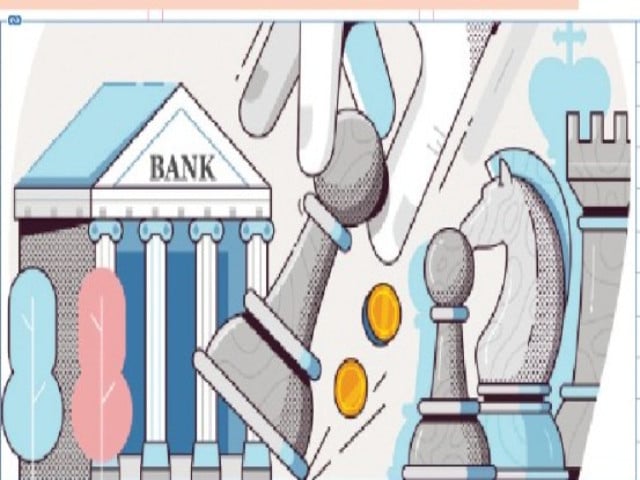[
ISLAMABAD:
An independent think tank has urged the government to choose between subsidising already-profitable banks or diverting limited fiscal resources toward productive sectors by ending the policy of banks guaranteed returns on government borrowing.
The Economic Policy and Business Development (EPBD), a new policy research institute, released the statement the same day a federal cabinet body criticised excessive subsidies to banks in the name of attracting remittances.
The Economic Coordination Committee (ECC) of the Cabinet was informed Friday that banks had claimed Rs200 billion under the Pakistan Remittances Initiative during the current fiscal year — Rs115 billion more than the budgeted subsidy.
The EPBD stated that the current fiscal structure forces a choice between supporting economic growth and subsidising banking profits through guaranteed government payments. It argued that Pakistani businesses face structural disadvantages compared to regional peers who enjoy policies that enhance rather than restrict productive economic activity.
The think tank stressed that economic growth requires policy alignment with development objectives — not bank profit maximisation. The current approach of keeping policy rates at 11% while allocating Rs7.2 trillion for domestic debt servicing ensures stagnation, while regional competitors grow their industrial and export capacity.
The government has allocated Rs8.2 trillion for total debt servicing — equal to 46% of the 2024-25 budget. Of this, Rs7.2 trillion will go to domestic banks holding government securities. With 59% of public debt held in floating-rate instruments, the think tank argued that reducing policy rates from 11% to 6% would yield immediate savings.
The government worsened this burden by issuing Rs2 trillion in fixed-rate Pakistan Investment Bonds (PIBs) at peak interest rates of 22% over the past two years, locking in excessive costs to the benefit of banks, it added.
By cutting interest rates to 6%, in line with falling inflation, the government could save Rs3 trillion on debt servicing. Even a portion of this amount, the think tank said, could lower business costs and stimulate employment.
A 6% rate would still offer banks real returns while easing debt burdens. The savings could support manufacturing revival, industrial expansion, SME financing, technology upgrades, and export growth.
The statement added that Pakistan’s future depends on diverting resources from guaranteed banking profits to investments that create jobs, enhance productivity, and ensure long-term growth.
Pakistani businesses cannot expand or generate employment while banks earn risk-free profits from public funds. In contrast, regional economies maintain 5.5% policy rates, allocate only 25% of budgets to debt servicing, and still achieve 6% GDP growth by prioritising business development.
The EPBD challenged the claim that lower interest rates fuel current account deficits. It cited the $19 billion deficit in 2021-22, which it attributed to exceptional, non-interest-sensitive imports such as $3.2 billion in COVID-19 vaccines, $15.6 billion in fuel, and $1.7 billion in smartphones. It said high interest rates did nothing to limit those imports and instead suppressed domestic activity.
The think tank added that guaranteed profits have led banks to retreat from commercial lending, opting instead for risk-free government bonds. With 97.3% of bank investments tied up in government debt, virtually no capital remains for working capital, expansion, or technology adoption.
Manufacturers struggle to finance inventory, exporters lose global competitiveness, and small businesses are excluded from credit. Pakistan’s banks have effectively become bond traders, contributing no value to the real economy while earning from taxpayer-backed securities.
The think tank also criticised the remittance structure, noting that Rs87 billion went to banks for basic transfersfunds that could instead support small businesses and entrepreneurship.
Its statement came as the ECC met to deliberate the future of remittance-linked subsidies. The finance ministry has decided to end the subsidies in 2024-25 due to pressure from banks and International Monetary Fund (IMF) constraints. The State Bank of Pakistan told the ECC it could no longer offer implicit support under IMF rules.
Although the ECC requested a transition plan, the finance ministry said no study has determined any positive impact of these subsidies. Officials noted that funds largely benefit banks and exchange companies, not overseas Pakistanis sending remittances. The central bank informed the ECC that remittance promotion schemes have existed since 1985, but their effectiveness remains unverified.
Without reform, the remittance subsidy bill could swell to Rs500 billion in coming years, warned a finance ministry official.
The think tank reiterated that businesses do not need subsidies or special treatment — just a level playing field. Reducing interest rates to 6% would bring Pakistan in line with regional rivals, restore manufacturing competitiveness, and improve global market access for exporters. Such a move would also accelerate technology adoption and job creation across sectors, the EPBD argued.
Although manufacturing capacity exists, it remains underutilised due to lack of financing. With 97% of banks’ balance sheets locked in public debt, there is little scope to support private sector growth.
Regional countries have demonstrated that supporting businesses through growth-oriented credit policies can deliver 6% growth while maintaining fiscal stability, it added.


